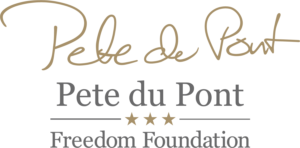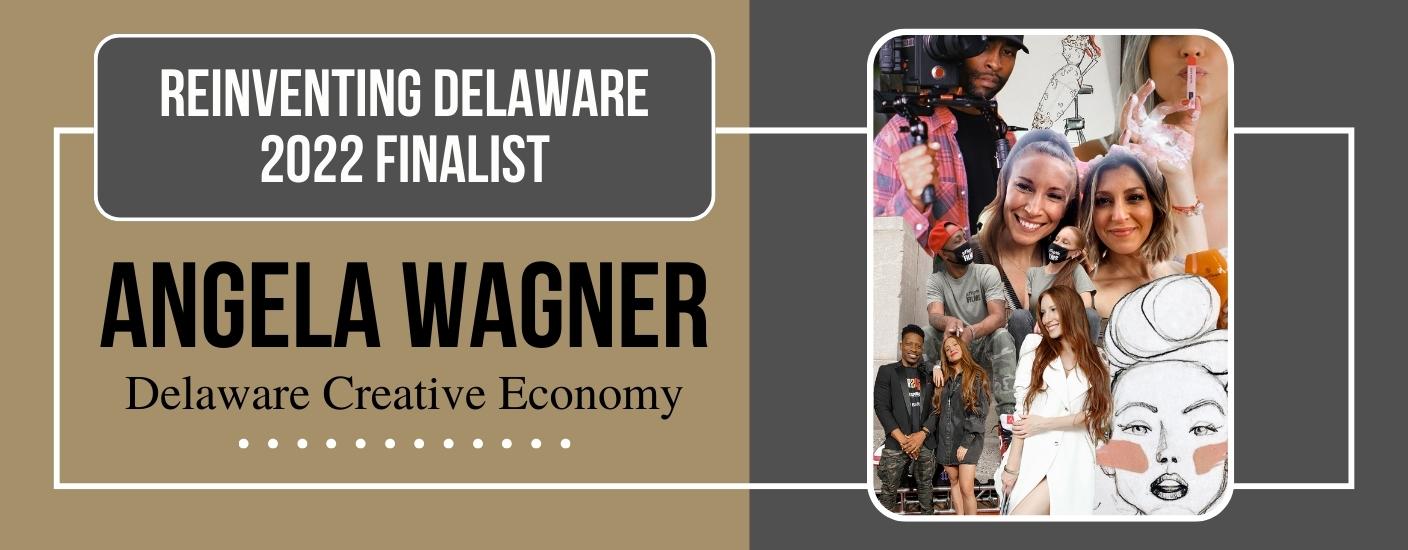We are pleased to introduce Angela Wagner, Esq. for the Delaware Creative Economy as one of our 2022 Reinventing Delaware Finalists.
The following interview provides additional information about Attorney Wagner and her initiative to boost the Delaware Creative Economy.
Pete du Pont Freedom Foundation (PDFF): Why did you decide to become an entrepreneur?
Angela: My decision to become an entrepreneur was less intentional, and more instinctual. I am an adventurous spirit, constantly curious, and forever seeking out knowledge. I strongly identify as a creative, needing to design my own definition of career success. Traditional notions of a 9-5 never suited my goals of freedom, flexibility, and endless exploration. In “traditional” career settings, I often found myself critiquing the status quo, wanting more than what others were offering. I knew I wouldn’t be satisfied with someone else’s idea of who I should be – I wanted to be the author of my own story.
PDFF: What difference will your business make in the community or the world?
Angela:
Let me first tell you about our business. Delaware lacks cohesive oversight over its creative economy. What is the “creative economy?” In 2000, Peter Coy introduced this term in a Bloomberg article in which he detailed the impending transformation of the world’s economy from an Industrial Economy to an economy in which the most important force is “the growing power of ideas.” Since then, there has yet to be a universal definition of the “creative economy” but it commonly refers to the following industries: Fashion, food, design, music, media producing video games, film, television, apps, and other content, theaters, galleries, studios, etc.
Without such oversight, the creative sector of the economy cannot thrive. For example, Delaware is completely looked over for opportunities to bring large-scale film production here due largely in part to lack of tax credits for the film industry, lack of resources, and lack of infrastructure. Those lack of opportunities don’t stop with film. In comparison, look at Austin, Texas. Austin boasts more than 200 live music venues, which helps drive the city’s burgeoning tourism sector. But music is just one critical piece of Austin’s creative economy, which includes some 50,000 arts-related jobs in areas that span film and television, gaming, and other visual arts. Despite various recessions that hurt so many cities, Austin continues to add population and jobs.
We are proposing to lead the charge in development, scaling, and monitoring the creative economy at large by establishing a non-government entity backbone organization which will work in conjunction with the Delaware Film Commission, arts alliances, and other agencies to ensure Delaware has a competitive edge in creative opportunities.
What difference will this make? An impactful difference! The economic impact of the creative economy has been overlooked in Delaware. In the United States, the arts and culture sector added $877 billion to national GDP and generated over $400 billion in wages for 5.1 million Americans. This contribution to the GDP is greater than that of the construction, tourism, and agriculture sectors. Our neighboring states of Pennsylvania and New Jersey have invested in the creative economy through priority initiatives of the state governments that provide funding, support, incentives, and workforce development to build the capacity of the creative economy. Our overarching goal is to understand the necessary components to develop structure that can support the growth of a strong creative economy in Delaware. Instead of repeating pitfalls experienced by other states in incentivizing creative economy activities before planning for the necessary infrastructure (including workforce) our plan seeks to prepare the State to keep creative economy jobs in Delaware, for Delawareans. We anticipate that by creating the necessary infrastructure, we will spur economic growth similar to what we’ve seen in other states (to name a few: retention of talent, attraction of new talent, and growth of new business endeavors).
- https://www.bloomberg.com/news/articles/2000-08-27/the-creative-economy
- http://creativecities.eiu.com
PDFF: How are you planning to achieve your business’ purpose?
Angela: It’s all about teamwork and structure. First, we will use the strategic plan developed by our partners at Social Contract as our roadmap through ideation. Next we will legally formalize our entity (we believe it will be a non-profit organization). Once established, we will hire individuals to sit on the board who have both entertainment industry and business acumen. With this group, we will develop a second strategic plan around the goals set forth for the organization, in conjunction with key players’ roles and responsibilities.
PDFF: In what ways will your business benefit Delaware?
Angela: This initiative will be by Delawareans, for Delawareans, for the betterment of Delawareans. Our goals center around providing opportunities for resident creatives who otherwise don’t have access to the entertainment industry at large. We will bring the industry to us through tax incentives, a backbone organization that advocates for workforce development opportunities, training programs, and more.
PDFF: How would you describe your business in a 30-second pitch?
Angela: Delaware is already home to over 1,800 creative businesses (3.6% of all businesses) that employ more than 7,300 people (1.4% of all employees), but the potential for growth is significant. In order to spur growth, we propose to form a non-government entity backbone organization. This entity will be the connecting hub for advocacy, information, workforce development, and all things creative in the State of Delaware. It will work in conjunction with already established organizations in the arts. The goal is to stop working in silos, and start working together for the betterment of the whole.
PDFF: Who has influenced your business perspective or philosophy?
Angela:
I’ve gained business perspective, philosophy, and acumen from working in the hospitality and entertainment industries for the last 15+ years. I am heavily influenced by strong, female business/entertainment moguls like Shari Bryant and Dessiree Perez of Roc Nation, Ava DuVernay of ARRAY, Pinky Cole of Slutty Vegan, Rihanna, Jennifer Lopez, and so many other women who are smashing barriers in their industries. Jennifer Lopez recently said in reflecting on her career, “I don’t do this for an award. I do this to tell stories, and to affect change, and to connect with people; to make them feel things because I want to feel something. Because I want to make the world a better place in my own little way . . . that’s why I do it.” That’s why I do this too, Jennifer.
Outside of strong women in the industry, I’m most influenced by David Geffen and his amazing story of how entrepreneurship can not only change your own life, others’ lives, and an entire industry.
PDFF: What advice would you give to an aspiring entrepreneur?
Angela: Pursue your passions, not the paycheck. Build a small team with diverse skill sets. Don’t stop until your wildest dreams are your reality.
—
Learn more about Angela and Delaware Creative Economy:
Angela Wagner’s business contact information:
Sunshine Consulting Firm LLC
Instagram: @theycallhersunshine
Phone: 570-239-2852
Email: [email protected]
The Delaware Collective for the Creative Economy: coming soon

